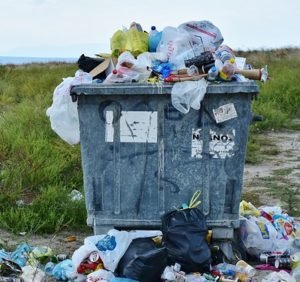Today, going green is something that’s becoming more and more important to many regular people around the world. Recycling where possible, spending money on brands that support environmental causes, choosing organic products such as organic fertilizers, rather than chemical ones, and making small yet effective green changes to your lifestyle can make a huge amount of difference to your environmental impact and carbon footprint over time. Sometimes, even the smallest of changes can make the biggest difference, so here are some easy tips that you can use to lead a greener lifestyle.
Tip #1. Plant a Tree:
 Sometimes, looking after the environment begins with caring for your own outdoor space. Whether you have a large, grassy garden or a small backyard, planting some foliage and looking after space can make a huge impact. Trees make for happier neighborhoods and offer some great natural benefits for shading your home from the sun in summer and protecting it from wind, rain, and snow in winter. As a result, a tree that provides shade to your home can help you cut down your energy use; you’ll use less air-conditioning in the summer and won’t need to turn heaters up as high when it’s cold. Follow the link to discover more about the best-growing shade trees.
Sometimes, looking after the environment begins with caring for your own outdoor space. Whether you have a large, grassy garden or a small backyard, planting some foliage and looking after space can make a huge impact. Trees make for happier neighborhoods and offer some great natural benefits for shading your home from the sun in summer and protecting it from wind, rain, and snow in winter. As a result, a tree that provides shade to your home can help you cut down your energy use; you’ll use less air-conditioning in the summer and won’t need to turn heaters up as high when it’s cold. Follow the link to discover more about the best-growing shade trees.
Tip #2. Conduct an Energy Audit:
Not everybody can afford to get solar panels installed or use other alternative energies, however, this doesn’t mean that there’s nothing else you can do to be greener about your energy use. Conducting an energy audit of your home allows you to determine where you’re losing any energy and the changes that you can make to cut back unnecessary waste. For example, weather-stripping your windows, using draught protectors, and filling in any small holes that may be causing a draft will make a bigger difference than you may realize.
Tip #3. Cycle to Work:
Over the years, cars have caused some of the biggest damage to the environment, yet, many of us are in a position where we have no other choice but to drive. Instead of giving up your car completely, you can make a difference by making the effort to go car-free whenever possible. For example, if you can cycle to work instead of driving, this will not only help to reduce carbon emissions – it’s also an awesome, free way to keep fit! And, cycling may even mean you’ll get there faster since your bicycle will fly past any long queues of traffic.
Tip #4. Support Ethical Causes:
There are several ways in which you can help the environment by supporting ethical causes around the world. For example, only purchasing fair trade fruit and vegetables, purchasing from companies that donate a percentage of profits to environmental issues, and avoiding brands that harm the planet, are just small ways that you can show your support. You may also want to consider budgeting for a small monthly donation to help with rebuilding rainforests, environmental research, wildlife conservation, climate control, or helping people to survive in countries that are and will be affected the most.
Tip #5. Go Meat-Free:
Nobody’s asking you to become a vegetarian or vegan unless that’s what you’re aiming for. But, there’s no denying that eating less meat and animal products can have a very positive impact on the environment. Tons of greenhouse gases are produced every year due to the production of animals such as cows for meat. In fact, did you know that for a family of four people, going meat-free just one day of the week has the same environmental impact over a year as using an electric car? Setting aside one or two days a week to enjoy tasty vegetarian or vegan meals is great for the planet and your taste buds!
Tip #6. Drive Safely:
You can reduce the amount of damage that you do to the environment by being careful as to how you drive your car on the roads. Driving aggressively, such as harsh braking and accelerating, is not only putting yourself and other road users at a higher risk, but also more damaging to the environment. On highways, stick to the speed limits instead of cruising over them – not only is it against the law, but it will also cause your vehicle to use fuel faster, requiring you to fill your tank more often. This is bad for both the environment and your pocket. So, drive carefully and stay to speed limits to minimize the environmental damage you cause by driving.
Tip #7. Use Energy-Saving Appliances:
 Energy-saving appliances may cost more to purchase initially, but over time, the investment will certainly pay off. Using an energy-saving appliance means that you can be sure it’ll use the least amount of energy every time. It’s a good idea to get energy-saving options for any appliances you use on a regular basis, such as a washing machine, tumble dryer, dishwasher, microwave, or refrigerator. You may also want to consider switching to energy-saving light bulbs for your home; these cost more than the regular ones but can save you up to ten times their price over their lifetime.
Energy-saving appliances may cost more to purchase initially, but over time, the investment will certainly pay off. Using an energy-saving appliance means that you can be sure it’ll use the least amount of energy every time. It’s a good idea to get energy-saving options for any appliances you use on a regular basis, such as a washing machine, tumble dryer, dishwasher, microwave, or refrigerator. You may also want to consider switching to energy-saving light bulbs for your home; these cost more than the regular ones but can save you up to ten times their price over their lifetime.
Tip #8. Recycle Plastic:
One of the biggest environmental problems that we’re facing today is the amount of plastic that is wasted on a daily basis. Since plastic does not break down, it’s causing havoc on the earth and in the sea for wildlife and sea creatures. Instead of throwing plastic in the trash, you should ensure that it’s taken to a recycling plant where it can be re-used instead of simply tossed to one side. When shopping, opt for items with non-plastic packaging, for example, by purchasing loose fruit and vegetables where possible. Instead of purchasing plastic water bottles, reusable drinking bottles are becoming increasingly popular. Even something as simple as not taking a plastic straw for your next drink can be an impactful step towards combatting this problem.
What steps do you currently take to lead a greener home life? We’d love to hear from you in the comments. For more learning opportunities, please join our EAT FREE Community where you can make some money making the planet better.



